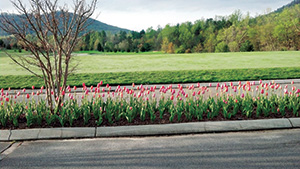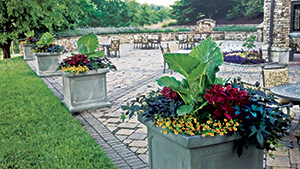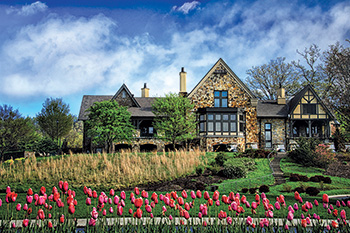The niche of the Horticulturist
Here’s how a horticulturist — part ecologist, soil scientist, florist, pest manager and artist — can help at your course.
No one expects the neighborhood teenage boy hired to cut the lawn to provide immaculate PGA Tour quality results.
In the same spirit it is unreasonable to expect a botanic garden to sprout beneath a crew member who has been tasked with planting a few marigolds around the clubhouse.
For the superintendent looking to add a signature element to the grounds of the golf course beyond the turf, consider seeking assistance from an expert horticulturist. Just as superintendents wield years of academic and practical experience to produce turf that is of professional quality, so too does the horticulturist enter the profession with a similar level of expertise and the ability to provide top-grade ornamental landscape management.
Horticulture 101
Horticulture itself (which turf management is a branch) is defined as the science and art of growing plants. And yet the title horticulturist remains vague and almost foreign in its inability to convey the duties of the profession.

Strategically placed plants can make an impact on visitors. By finding locations to group plants, a memorable display can be achieved with a limited budget. Photo: Hannah Schrum
The job description of the horticulturist is often simply described as “playing with flowers all day.” In reality, the job entails a diverse skill set to be employed as the successful horticulturist that is part ecologist, soil scientist, florist, crew manager, pest manager, artist, buyer, pathologist and public gardener. The golf course horticulturist is a niche role, still novel in the golf maintenance industry, but an increasing number of superintendents are finding the many benefits of staffing an expert in this position to help refine and polish the grounds beyond the turf.
In economic terms, the horticulturist adds an appealing value-added aesthetic to the grounds in a way that both compliments and reflects the design of the course. The first impressions and curb appeal conveyed by expertly landscaped grounds reflects well on the facility. Isn’t it a terrible dichotomy to maintain an immaculate turf if the clubhouse is weed-ridden and wholly forgettable?
Ornamental horticulture is the eye-catching, agronomic icing on the cake. The golf course, after all, is a place people go to with the anticipation of enjoying the outdoors in a beautifully manicured environment. The astute superintendent will realize that enhanced landscapes attract more than bees and butterflies — they attract member satisfaction. Golfers are an audience that are already attuned to the detail of the cut and roll of each green, approach and fairway. Something as simple as a few hundred tulip bulbs is the sort of dramatic flair that they appreciate and welcome enthusiastically.
The public gardener

Placing plants within decorative containers is one way to dress up an area easily. Use of annual plants is also a simple way to spruce up spaces around the course. Photo: Hannah Schrum
The work of a horticulturist involves more than creating visual botanical thrills. The wide skill set can be utilized to increase the sustainability of the golf course and clubhouse on the whole. For example, fresh herbs and greens can easily be cultivated for the club restaurant. And flowers cut from the grounds can serve double duty as fresh bouquets for special events. Furthermore, a seasoned horticulturist can increase the sustainability of some maintenance operations by weighing in on cost-saving landscaping decisions. Well-advised plant choices can save thousands in mulch and labor costs over just a few seasons.
In addition to the tangible and quantitative results served by the horticulturist, his/her role as public gardener provides a unique opportunity to connect with members and guests of the golf course. Unlike the golf maintenance team, who are diligent in completing their work so that they remain (mostly) out of sight/out of the way of golfers, the horticulturist working on the club side of the grounds is highly visible and approachable to members. This daily interaction with members fosters a positive perception that the golf course is under the care of proactive and detail oriented management.
A horticulturist can provide the crown jewel to the golf course by weaving landscape elements that captivate and delight members while enhancing their outdoor experience. While not every superintendent is able to invest in hiring a horticulture specialist outright, even a small plant budget combined with some tips (see sidebar) for success can provide commendable results in beautifying the grounds.
Seven tips for success
Follow these tips to increase the quality of the ornamental plant beds on any golf course:
- Embrace using annuals to achieve quick and showy results that stay the whole season.
- Find a good local garden center that will give you reliable plant advice. Your friendly fertilizer salesperson may be glad to sell wholesale flats of marigolds to you, but your local garden center may be able to make a better suggestion for your location. Yes, you will pay a premium for these, but you will typically get stronger plants and finer varieties. The key in successful garden design lies in attention to detail. Starting with Grade-A quality plants will get noticed.
- Once you have planted the ornamentals don’t forget them! Apply liquid fertilizer every two to three weeks and make sure the beds are irrigated reliably.
- Bulbs are easy to grow and always a crowd pleaser. Wholesale vendors offer many unusual varieties that double the crowd-pleasing factor.
- Identify shrubs before pruning. Prune flowering shrubs such as hydrangeas, azaelas, Chinese fringe flower, quince and forsythias at the correct time (dictated by the type of shrub, not relegated to slow season cleanup tasks) to enhance flowering in the current season or preserve flowering in the following season.
- Containers are a fast way to make a classy impression and show off flare. They are also easy to maintain through the season.
- If you can’t invest in landscaping vast areas between the parking lot and clubhouse, then pick one or two high impact, highly visible spots to focus on. A few pansies planted over a half dozen areas around the clubhouse will barely get noticed. Plant 10 flats of pansies in one spot and the affect will be memorable. Quality of design and plant matter will get noticed and your praise will be sung all season long.
Hannah Schrum is the horticulturist at The Cliffs at Walnut Cove in Arden, N.C.











